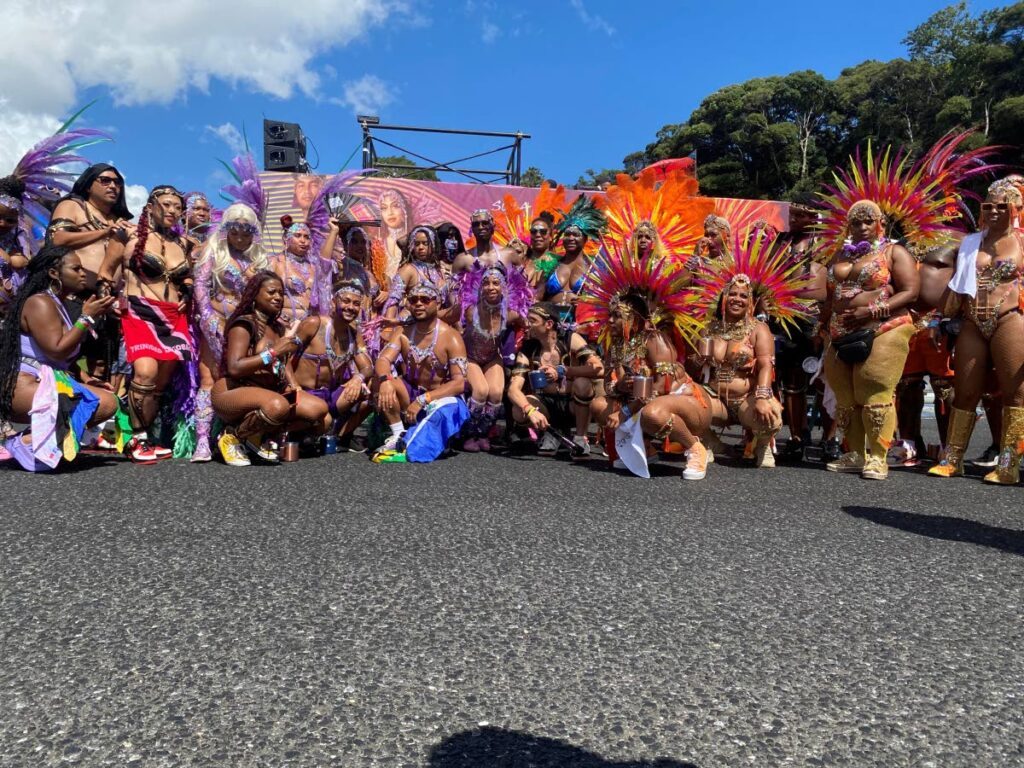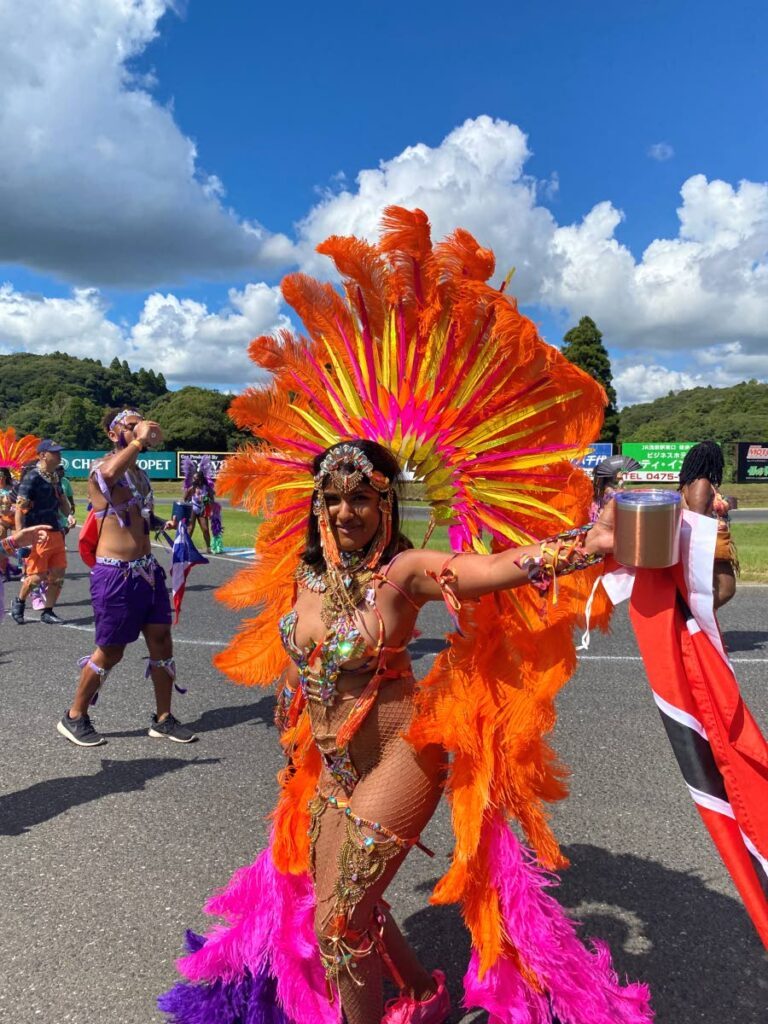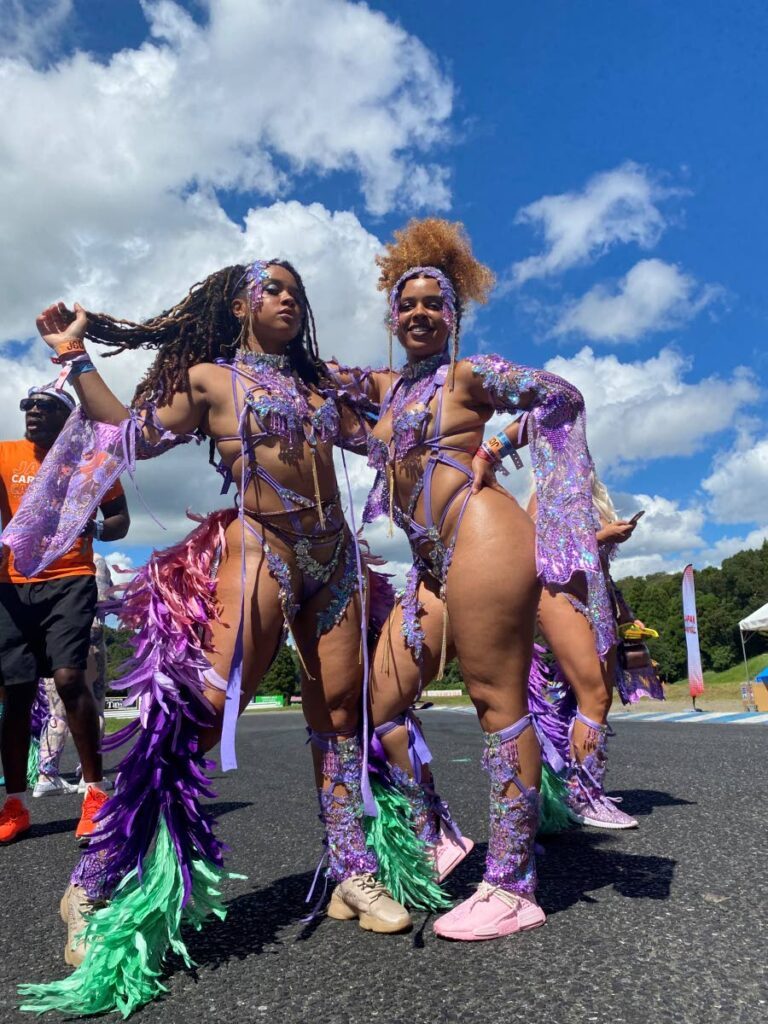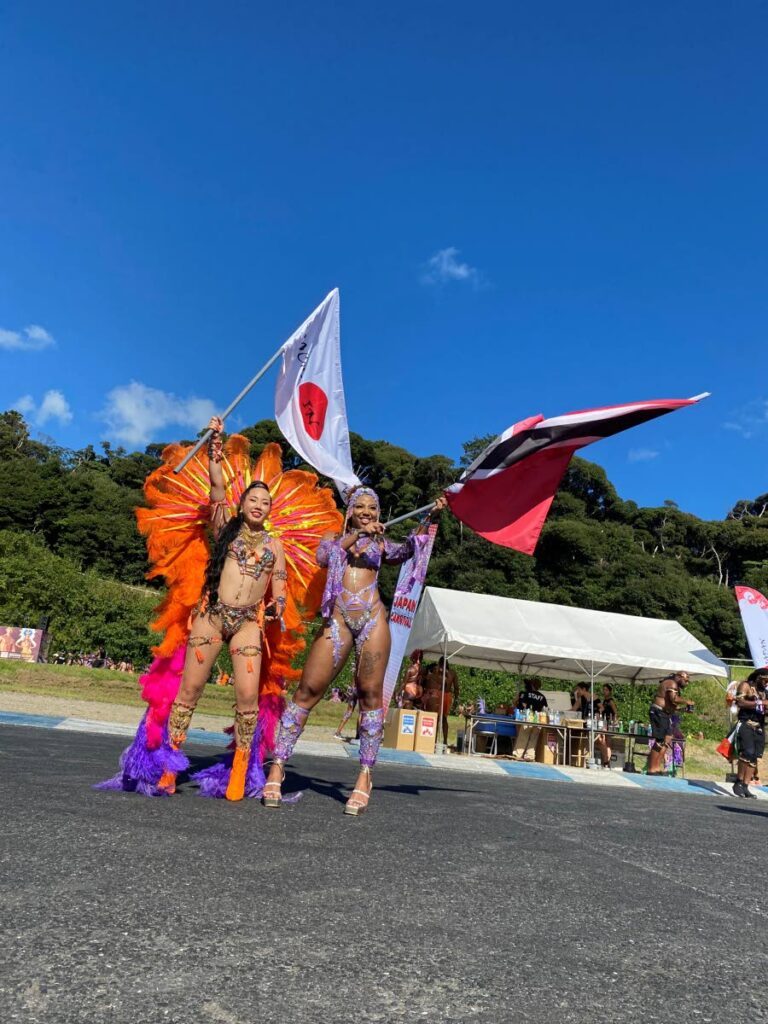Japan Caribbean Carnival a big hit

RHIANNA MCKENZIE
The reviews are in, and the inaugural Japan Caribbean Carnival is being hailed by many attendees as a memorable, once-in-a-lifetime experience.
From September 13-17, participants were treated to tours and parties, and on September 18, the annual Soca in Japan events ended in a Trinidad and Tobago-style parade of the bands at the Moraba Twin Circuit race track in Chiba Prefecture, Japan.
While soca events, including parties, boat rides and J’Ouvert have been happening for a few years in Japan, this year marked the first time participants were able to follow a big music truck and revel on the road as they would in the islands.
Many people in Japan are quite familiar with soca music which has been popular there for years, prompting the rise of several Japanese-led steelbands, Japanese soca DJs, dancers and dance classes, and Caribbean parties in major cities like Tokyo and Kobe.

Over the weekend, in an unrelated event, there was also a pan festival in Kobe Prefecture where Trinis and Japanese locals were serenaded by the Fantastics Sukiyaki Steel Orchestra at the Kobe Steelpan Carnival.
But organising a parade of the bands-style event has been a dream of Soca in Japan organiser Kegon Toussaint and his team for a few years. Toussaint thanked his team, comprised of Trinbagonian expats and Japanese locals, for their dedication in executing this vision.
“Thank you to everyone who came out this weekend. It was truly unbelievable and a lot of hard work by the team. Our culture is powerful. Next year can only get bigger and better.”
What started as a weekend of soca events in Tokyo, has evolved into a week-long excursion experience attracting soca and Carnival lovers from all over the world. Participants in the Soca in Japan weekend were able to experience a unique cross culture of Japan and the Caribbean, attending soca parties dressed as their favourite anime characters, visiting shrines and temples in the Tokyo area, viewing a traditional Sumo wrestling match and getting down and dirtying themselves at a J’Ouvert party.

Soca artistes Nailah Blackman, Mical Teja and Jadel were all in attendance, much to the delight of those present. The experience reached its climax with the parade on September 18, a national holiday in Japan known as Respect for the Aged Day. The weekend lineup of events were all sold out.
Najja Forbes, originally from south Trinidad and now living in Yokohama City, Tokyo prefecture, attended three of the weekend’s events, including the parade, and the Rum ’N' Bass party held in Shibuya City, Tokyo.
“The crowd was energetic and joyful,” he told Newsday.

“It was clear that everyone came to have a good time, especially at the J’Ouvert and the Carnival parade.”
He said while soca music is not exactly known throughout the country to most, those who are familiar with the Caribbean culture love it wholeheartedly.
“I think the soca community try their best to have a good representation of soca music by staying up-to-date with the new songs and having events throughout the year.”
Forbes said having TT artistes come to Japan to perform was a great way to represent the culture.

“I hope more artistes come in the future.” She is excited to participate next year and believes the brand has potential for future growth.
“I believe in five to ten years, once they stay on track, it will only get bigger.”
She commended the organisers on offering a great experience and was particularly impressed with how well-organised the transportation arrangements were. Organisers created videos which were posted to their social media accounts to help visitors navigate the sometimes-tricky Japanese public transportation system, to find the hired buses that would take them to and from the venues. Forbes said while nothing compares to Carnival at home, it was nice to have a taste of it.
Larissa Hosein from Arima and Yoshoda Seelochan from Princes Town are friends who arrived in Japan in 2021. Having participated in Soca Weekend last year as visitors, they decided to help out the team this year. Hosein, who assisted visiting tourists during the tours of Tokyo, said the tours were primarily geared toward creating a unique experience for first-time visitors to Japan. She said many people go “Carnival hopping,” travelling all over the world to experience the culture, and the tours were designed as an attractive incentive for them to have that experience in Japan.

Although she said there is a lot of room for improvement, she believes with the help of both the Japanese and TT governments the initiative has the potential to grow.
“With the support of sponsors and the Trini community…we can build it and maybe even reach the levels of Notting Hill (in the UK) or Caribana (in Canada)."
Seelochan said she believes there are also opportunities for business, particularly Caribbean food vendors, to come to Japan and ply their trade.
“There are many people coming from other Caribbean islands who are not familiar with the Japanese palette and some of the meals (in the morning) were Japanese-style breakfast. Having Trinidad caterers, from home, would be amazing.”
She said incorporating more traditional mas, such as canboulay and other Carnival characters, would also be an excellent cultural exchange opportunity.
The parade, which looked to be just about 200 masqueraders, was small but very diverse and, above all, enthusiastic, and participants seemed undaunted by Japan’s notoriously brutal summer heat. With added high humidity, temperatures in Tokyo during the summer have been known to reach as high as 40 degrees Celsius. Travellers from Barbados, Cuba, Jamaica, and US citizens with Caribbean backgrounds were all in attendance, proudly displaying their respective flags.
Travelling to Tokyo from New York, Sherry-Ann Prezeau, born to Haitian parents, has been to Carnival events in the US, but had never played mas outside the US.
“The experience has been wonderful. It’s like checking two things off your bucket list – coming to Japan and also getting to play mas.” She said it had been an amazing experience for her to see the culture so far away from the Caribbean. Prezeau was adamant that the experience, although expensive, was definitely worth it. “The payment plan is very flexible and I think everyone should do it.”
Another foreigner living in Japan who wished to be named only as Michael, said the experience was his first taste of Carnival. Hailing from Uganda, he was impressed to see the diversity of the group and how quickly they all connected with each other in such a brief time.
“The people are very connected and open to each other. I see love. I see people meet here for the first time, but the connection is there.” He said he has seen images of Carnival in Jamaica and wishes to visit the island one day to experience it for himself.
As for Japanese locals, seeing Caribbean Carnival on their home turf had been a dream for a long time. Iyona Mukuni, who has visited Trinidad for Carnival on five occasions since 2011, said she has worked with the team in Japan since its inception in 2019.
“It’s a lot of work, but we love Trinidad culture so we want to enjoy Trinidad culture in Japan too and we want more Japanese people to know this culture. Soca music makes Japanese people happier,” she said with a laugh.
Chiaki Iida, who has been to Trinidad Carnival twice, said the scale may not be the same as Caribbean Carnival, but is hopeful it will elevate to something more in the future.
“This (Carnival) is more Asian culture mixed with Caribbean culture. I think it is unique and good for locals to experience.”
She said as much as she loves Trinidad, it was special to her to experience Carnival in her own country.
“I think it’s definitely good because it’s cultural exchange, so I think it’s an amazing way to get to know each other.” She said the influence of Caribbean culture can only benefit Japan.
“Japanese people work too much,” she joked. Iida said when they started in 2019, the events were very small and to make it to this level has been a huge success for the team. “I am sure it will get bigger.”

Comments
"Japan Caribbean Carnival a big hit"